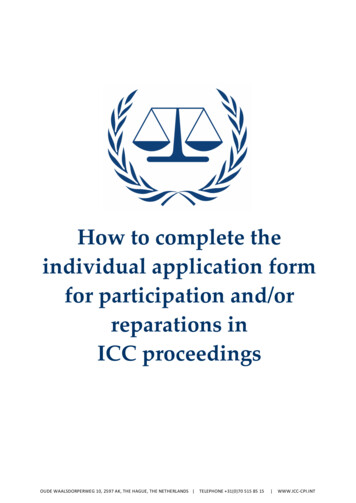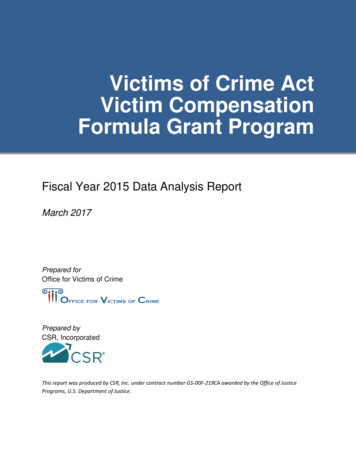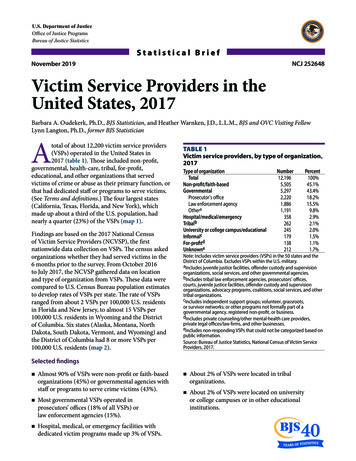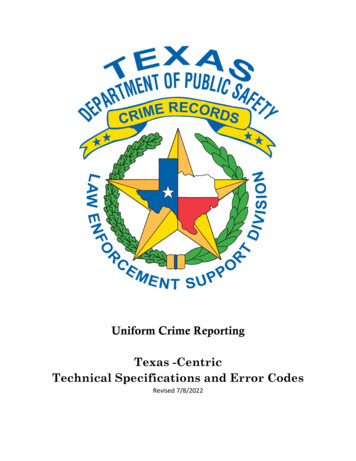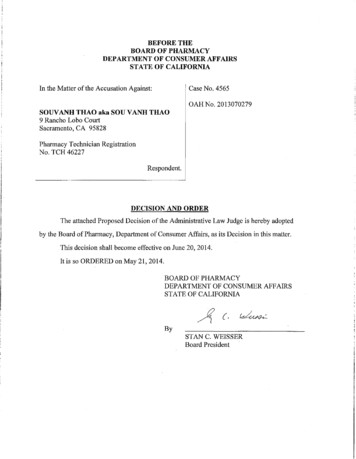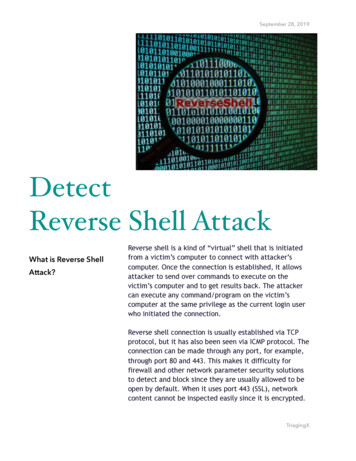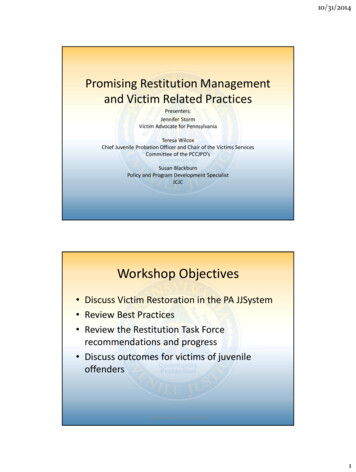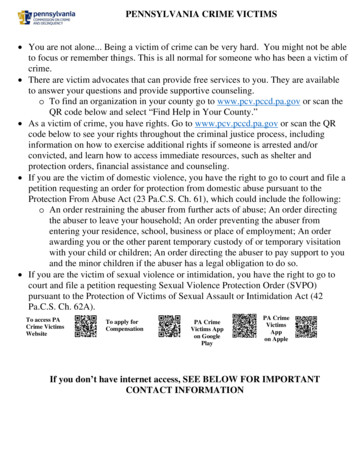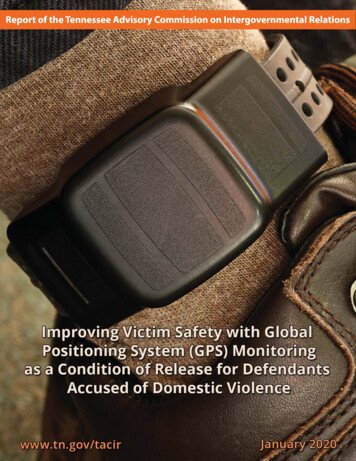
Transcription
TACIRPublication PolicyReports approved by vote of the Tennessee Advisory Commission onIntergovernmental Relations are labeled as such on their covers with thefollowing banner at the top: Report of the Tennessee Advisory Commission onIntergovernmental Relations. All other reports by Commission staff are preparedto inform members of the Commission and the public and do not necessarilyreflect the views of the Commission. They are labeled Staff Report to Membersof the Tennessee Advisory Commission on Intergovernmental Relations on theircovers. TACIR Fast Facts are short publications prepared by Commission staff toinform members and the public.Tennessee Advisory Commission on Intergovernmental Relations226 Anne Dallas Dudley Boulevard · Suite 508 · Nashville, Tennessee 37243Phone: 615.741.3012 · Fax: 615.532.2443E-mail: tacir@tn.gov · Website: www.tn.gov/tacir
Report of the Tennessee Advisory Commission on Intergovernmental RelationsImproving Victim Safety with GlobalPositioning System (GPS) Monitoringas a Condition of Release for DefendantsAccused of Domestic ViolenceJennifer Barrie, M.S.Senior Research Associate Nathan Shaver, J.D.Senior Research Associate David Lewis, M.A.Research Manager Teresa GibsonWeb Development & Publications ManagerOther Contributing StaffMark McAdoo, M.S.M.Research ManagerJanuary 2020
Recommended citation:Tennessee Advisory Commission on Intergovernmental Relations. 2020. Improving Victim Safetywith Global Positioning System (GPS) Monitoring as a Condition of Release for Defendants Accused ofDomestic Violence.Tennessee Advisory Commission on IntergovernmentalRelations. This document was produced as an Internetpublication.
State ofTennesseeTennessee Advisory Commission on Intergovernmental Relations226 Anne Dallas Dudley Boulevard, Suite 508Nashville, Tennessee 37243January 16, 2020The Honorable Randy McNallyLt. Governor and Speaker of the SenateThe Honorable Cameron SextonSpeaker of the House of RepresentativesThe Honorable Mike BellChair, Senate Judiciary CommitteeThe Honorable Andrew FarmerChair, House Criminal Justice CommitteeThe Honorable Mike CarterChair, House Civil Justice CommitteeMembers of the General AssemblyState CapitolNashville, TN 37243Ladies and Gentlemen:Transmitted herewith is the Commission's report on its study of the effectsand implementation of Global Positioning System (GPS) monitoring asa condition of release for defendants accused of stalking, sexual assault,domestic abuse, and violations of orders of protection, which was preparedin response to Public Chapter 827, Acts of 2018. The report recommendsthat to help maximize GPS monitoring's effectiveness for increasingthe safety of domestic violence victims during the pretrial period, localjurisdictions should consider adopting it as but one component of alarger coordinated community response, which would include stronginteragency partnerships, cooperation and commitment from stakeholders,education and training, and victim support services such as family safetycenters, domestic violence high-risk teams, and lethality assessments.The Commission approved the report on January 16, 2020, and is herebysubmitted for your consideration.Respectfully yours,Cliff LippardExecutive Director
226 Anne Dallas Dudley Blvd., Suite 508Nashville, Tennessee 37243-0760Phone: (615) 741-3012Fax: (615) 532-2443www.tn.gov/tacirTO: Commission MembersFROM: Cliff LippardExecutive DirectorDATE: 16 January 2020SUBJECT: Public Chapter 827, Acts of 2018 (Global Positioning System Monitoring)—Final Report for ApprovalThe attached Commission report is submitted for your approval. It was prepared inresponse to Public Chapter 827, Acts of 2018, which directs the Commission to conducta study of the effects and implementation of Global Positioning System (GPS)monitoring as a condition of release for defendants accused of stalking, sexual assault,domestic abuse, and violations of orders of protection. The report has been updatedbased on members’ discussion with a panel of experts at the last meeting. To addressmembers’ concerns about GPS data, information was added about data ownership anduse and open records considerations. A new appendix was added with therecommendations and conclusions from the Memphis and Shelby County pilotprogram evaluation. Public Chapter 208, Acts of 2019, extends the deadline for thestudy and requires the Commission to report its findings and recommendations,including any proposed legislation, regarding GPS monitoring to the speakers of thesenate and the house of representatives and the chairs of the judiciary committees of thesenate and the house of representatives by February 1, 2020.The recommendations in the draft report remain the same. The outcomes of pilotprograms like those in Memphis and Shelby County and Connecticut suggest a wayforward for communities interested in implementing similar pretrial programs forvictim safety. To help maximize GPS monitoring’s effectiveness for increasing thesafety of domestic violence victims during the pretrial period, local jurisdictions shouldconsider adopting it as but one component of a larger coordinated communityresponse—including strong interagency partnerships, cooperation and commitment
from stakeholders, education and training, and victim support services such as familysafety centers, domestic violence high‐risk teams, and lethality assessments. Localgovernments that choose to implement GPS monitoring programs should work withpartner agencies to clarify roles and expectations and develop and commit toprocedures and policies. Regardless of whether local governments choose toimplement GPS monitoring programs, law enforcement and victim advocate agenciesshould be encouraged to adopt validated lethality assessments because they are aneffective tool for identifying victims most at risk of serious harm or death, and they helpprioritize victims’ access to safety planning and other services. Given the importance ofoperating a pretrial GPS program within a larger coordinated community response, ifthe General Assembly appropriates additional funds specifically for real‐time GPSmonitoring of domestic violence defendants, it should require that local governmentsdrawing money from the fund, at a minimum, adopt a validated lethality assessmenttool to both help identify which domestic violence victims are in the greatest dangerand immediately connect those victims with safety planning and other services toimprove their safety. Local governments adopting pretrial GPS monitoring programsmay also choose to prioritize high‐risk cases and certain types of offenses, includingintimate partner violence, strangulation, stalking, threats involving firearms, orviolations of protection orders.
Improving Victim Safety with Global Positioning System (GPS) Monitoring as a Conditionof Release for Defendants Accused of Domestic ViolenceContentsSummary and Recommendations: Improving Victim Safety with GlobalPositioning System (GPS) Monitoring as a Condition of Release for DefendantsAccused of Domestic Violence.1GPS monitoring for domestic violence is most effective in improving victim safetywhen implemented within a well-coordinated system.2The cost of pretrial GPS monitoring programs varies, and local governments mayneed state assistance to fund their use.4The Implementation and Effects of Global Positioning System (GPS) Monitoringas a Condition of Release for Domestic Violence Offenses.7Although the rate of domestic violence is decreasing, the issue remains a seriousone in the US and in Tennessee.7Although electronic monitoring is commonly used in Tennessee and other states,it is less commonly used for domestic violence defendants before trial. 14Domestic violence is a complex issue that requires a coordinated response. 17Funding GPS monitoring as a condition of release is challenging. 28References. 35Persons Contacted. 39Appendix A: Intimate Partner Violence Victims Reported by Tennessee Bureauof Investigation by Type of Offense and County in Tennessee, 2018. 43Appendix B: Explanation of Bail, Bond, and Conditions of Release. 47Appendix C: Public Chapter 406, Acts of 2011. 49Appendix D: Public Chapter 827, Acts of 2018. 53Appendix E: Maryland Lethality Assessment Program Questions. 55Appendix F: Battered Women’s Justice Project “Risk Assessment”. 57Appendix G: Recommendations for Model GPS Monitoring Legislation. 61Appendix H: Memphis and Shelby County GPS (Global Positioning System)Monitoring of Domestic Violence Suspects in Shelby County, Tennessee. 63Appendix I: Public Chapter 505, Acts of 2019. 67WWW.TN.GOV/TACIRi
Improving Victim Safety with Global Positioning System (GPS) Monitoring as a Conditionof Release for Defendants Accused of Domestic ViolenceSummary and Recommendations: ImprovingVictim Safety with Global Positioning System(GPS) Monitoring as a Condition of Release forDefendants Accused of Domestic ViolenceDomestic violence is prevalent in Tennessee and across the United States.Tennessee’s definition of domestic violence includes that which occurswithin domestic relationships between parents and children, siblings, oreven roommates, but violence between intimate partners—most oftenmen against women—is the most commonly discussed and studied.Governmental and non-governmental agencies at the national, state, andlocal levels have focused not only on reducing domestic violence butalso on improving victim safety. One of the most dangerous periods forvictims of domestic violence is the pretrial period after their abuser hasbeen charged with the crime and has been released pending trial.Under both the Tennessee Constitution and state statute, criminaldefendants have a right to bail in all non-capital cases. When determiningconditions of release for defendants accused of domestic violence, sexualassault, stalking, or violating orders of protection, magistrates are requiredto “review the facts of the arrest and detention of the defendant anddetermine whether the defendant is a threat to the alleged victim or publicsafety or reasonably likely to appear in court.” If they find the defendant isa threat or is unlikely to return to court, they are required to set at least onecondition of release. In domestic violence cases, these conditions usuallyinclude bonds and no-contact orders. But another condition availableto magistrates in Tennessee is pretrial global positioning system (GPS)monitoring.One of the mostdangerous periods forvictims of domesticviolence is the pretrialperiod after their abuserhas been charged withthe crime and has beenreleased pending trial.Although GPS monitoring nationwide is most commonly used within thecriminal justice system for tracking convicted offenders, it is also used forpretrial monitoring of domestic violence defendants in some jurisdictions,with the intent of quickly alerting a victim if the defendant comes too close.Some experts and researchers in the field of domestic violence, however,question GPS monitoring’s effectiveness in keeping victims safe andreducing recidivism during the pretrial period. Funding GPS monitoringis also a challenge. But in light of its potential as a tool to improve victimsafety in domestic violence cases, Public Chapter 827, Acts of 2018, directsthe Tennessee Advisory Commission on Intergovernmental Relations(TACIR) to conduct a study of the effects and implementation of GPSmonitoring as a condition of release for defendants accused of stalking,sexual assault, domestic abuse, and violations of orders of protection.WWW.TN.GOV/TACIR1
Improving Victim Safety with Global Positioning System (GPS) Monitoring as a Conditionof Release for Defendants Accused of Domestic ViolenceGPS monitoring for domestic violence is most effectivein improving victim safety when implemented within awell-coordinated system.Rather than a free-standing solution for protecting victims of domesticviolence during the pretrial period, GPS monitoring requires coordinationamong courts, local law enforcement, local government, private vendors,and victim support services to be effective. According to the NationalNetwork to End Domestic Violence,GPS monitoringrequires coordinationamong courts, locallaw enforcement, localgovernment, privatevendors, and victimsupport services to beeffective.It is critical to understand that GPS monitoring of offendersis only effective as part of a larger coordinated system. Ifnot enough trained officers can respond quickly when anoffender approaches a victim and if courts lack resourcesto hold offenders accountable, the monitoring devices willnot be effective. It is vital that a community‐based advocateexplains to the victim how the offender tracking systemworks and its benefits and risks.Examples of support services that can be used to implement a coordinatedapproach include family safety or justice centers, which are physical locations wheremultiple agencies are available in one building for victims to safelyreceive assistance and services; domestic violence high-risk teams, which review high-riskdomestic violence cases and involve the participation of multipleagencies to determine and plan needed interventions to helpvictims; and lethality assessments, sometimes more broadly referred to asdanger or risk assessments, which use victims’ responses to aseries of standardized questions to help law enforcement in thefield and victim advocates determine the danger a victim is in andconnect high-risk victims to services in an attempt to improve theirsafety.In Tennessee, Memphis’ and Shelby County’s GPS monitoring pilotprogram, which operated from 2016 to 2019, monitored approximately 400defendants at a given time as a condition of release for certain domesticviolence offenses. The program developed its own assessment scoringtool, which incorporated a lethality assessment, pretrial risk assessment,and victim statement, to determine who should be monitored. Its goalwas to improve victim safety by reducing repeat instances of domesticaggravated assault and by increasing the number of victims who seeksupport services. The program evaluation found that, in addition toother results, defendants who were monitored were more likely to bearrested for violation of bond conditions, and their cases took longer to2WWW.TN.GOV/TACIR
Improving Victim Safety with Global Positioning System (GPS) Monitoring as a Conditionof Release for Defendants Accused of Domestic Violencebe dismissed for lack of prosecution. Victims who carried a device wereless likely to be repeat victims. The evaluation concluded that to continuewith an effective program, courts, law enforcement, local government, andorganizations providing victim support services need to be engaged andcommitted, and expectations, roles, and procedures for each need to beclear. For example, to help improve victim safety, monitoring needs to be“real-time,” meaning it is done 24 hours a day, seven days a week. Thisrequires coordination and communication between agencies so that staffare available to constantly monitor and immediately respond to alerts andassist victims, as opposed to responding the next day.A pilot project in three judicial districts in Connecticut offers anotherexample of collaboration. It began in 2010 to test the effectiveness of GPSmonitoring of high-risk domestic violence offenders, and by 2013 noneof the 168 offenders had re-injured or killed victims. The program islimited to violations of orders of protection and uses an assessment toolto determine which cases are high-risk and which defendants should bemonitored. Each participating district established local implementationteams—similar to high-risk teams—which include judges, prosecutors,public defenders, court clerks, law enforcement, victim advocates, courtsupport staff, and the department of correction. According to the programmanager, “the key to the program’s success is a combination of aggressiveenforcement and tight collaboration between the judicial system, localpolice, and domestic violence workers.”The outcomes of pilot programs like those in Memphis and Shelby Countyand Connecticut suggest a way forward for communities interestedin implementing similar pretrial programs for victim safety. To helpmaximize GPS monitoring’s effectiveness for increasing the safety ofdomestic violence victims during the pretrial period, local jurisdictionsshould consider adopting it as but one component of a larger coordinatedcommunity response—including strong interagency partnerships,cooperation and commitment from stakeholders, education andtraining, and victim support services such as family safety centers,domestic violence high-risk teams, and lethality assessments. Localgovernments that choose to implement GPS monitoring programsshould work with partner agencies to clarify roles and expectations anddevelop and commit to procedures and policies. Regardless of whetherlocal governments choose to implement GPS monitoring programs, lawenforcement and victim advocate agencies should be encouraged toadopt validated lethality assessments because they are an effective toolfor identifying victims most at risk of serious harm or death, and theyhelp prioritize victims’ access to safety planning and other services. TheTennessee Law Enforcement Training Academy already provides trainingfor the Maryland Lethality Assessment Program (LAP), which is designedfor intimate partner violence and has been found to be effective by the USCenters for Disease Control and Prevention (CDC), at no cost to local lawWWW.TN.GOV/TACIRThe Memphis andShelby County GPSmonitoring pilotprogram evaluationconcluded that courts,law enforcement,local government, andorganizations providingvictim support servicesneed to be engagedand committed, andexpectations, roles, andprocedures for eachneed to be clear.3
Improving Victim Safety with Global Positioning System (GPS) Monitoring as a Conditionof Release for Defendants Accused of Domestic Violenceenforcement or victim advocate agencies. To participate in the programand receive training, law enforcement agencies and victim advocates arerequired to adopt and implement the LAP as part of their protocol.The cost of pretrial GPS monitoring programs varies, andlocal governments may need state assistance to fundtheir use.GPS program costs rangefrom about 4 to 15per defendant per day,depending on the typeand total number ofdevices, which servicesthe vendor provides,whether the governmentagency or defendantis paying, and whetherthe victim also carries adevice.The cost of funding GPS monitoring programs depends on how theyare structured, including the extent to which local governments partnerwith private vendors. In Memphis and Shelby County, for example, thecontracted private vendor leased equipment and software to the program,and the city and county used their own staff and facilities to managedevices, monitor, communicate, and send alerts. But the demand for 24/7dedicated personnel can be difficult to meet for local governments and canbe stressful for staff who are on-call. Alternatively, for a higher fee, localgovernments can contract with their vendor to provide all services up tothe point when law enforcement responds to calls, as is done in GrundyCounty, for example. In general, local governments’ GPS program costsrange from about 4 to 15 per defendant per day, depending on the typeand total number of devices, which services the vendor provides, whetherthe government agency or defendant is paying, and whether the victimalso carries a device.1Finding sufficient and recurring funding for pretrial GPS monitoring indomestic violence cases is an obstacle to implementation. In Tennessee,funding sources include defendants, grants, local revenue, and the state’sElectronic Monitoring Indigency Fund (EMIF). Although Tennessee lawauthorizes magistrates to order defendants to pay for monitoring, themajority of defendants cannot afford to. The Administrative Office of theCourts estimated in 2012 that “over 75% of persons charged with a criminaloffense in Tennessee trial courts are determined to be indigent,” andTACIR staff have not found evidence that indigency rates for defendantsin domestic violence cases are significantly different. While grants areoften used to fund programs initially and can be helpful to get a programstarted, they are limited to specified timeframes and are not sustainable,long-term funding sources.Tennessee’s EMIF is now available to pay 50% of the cost of pretrial GPSmonitoring for indigent domestic violence defendants, following theenactment of Public Chapter 505, Acts of 2019, with the other 50% coveredby local governments. The fund is also used to pay for alcohol monitoringdevices in driving under the influence (DUI) cases. However, dependingThese cost estimates do not include the agencies’ administrative or personnel costs, the costof law enforcement’s response to calls and alerts, extra expense for lost or damaged devices, oradditional cost to victim advocates to provide services. Local governments decide how to allocatetheir resources and work with the vendor to most effectively implement their program.14WWW.TN.GOV/TACIR
Improving Victim Safety with Global Positioning System (GPS) Monitoring as a Conditionof Release for Defendants Accused of Domestic Violenceon how many local governments choose to participate in the EMIF, currentfunding most likely will not be enough to cover the state’s share in allcases. Court fees for domestic violence and DUI offenses are earmarked forthe fund but have resulted in approximately 300,000 in annual revenue,and revenue is trending down according to Treasury Department staff.Although Governor Lee’s fiscal year 2020 budget proposed an additional 1.5 million for the EMIF, which the General Assembly appropriated,the amount is non-recurring. Moreover, the EMIF currently prioritizesfunding for ignition interlock devices in DUI cases, with the cost of othertypes of alcohol and GPS monitoring covered only with money remaining.As of October 2019, 18 counties have committed to participation in theprogram and budgeted a total of 492,000 for fiscal year 2020, which thestate is required to match if funds are available.If every local government opted into the EMIF program for pretrial GPSmonitoring for indigent defendants in every domestic violence case,the cost to local governments would be approximately 16.6 millionannually—which the state would match if funds were available.2 Iffunding were limited to all intimate partner violence, the state’s share offunding would be approximately 10.9 million annually, given the sameassumptions. And if it were limited to higher risk cases, which typicallyinvolve stalking, sexual offenses, and aggravated assaults, the state’s sharewould be 1.8 million annually. However, the state treasurer is authorizedto stop accepting and reimbursing claims if the fund is insufficient to paythe claims.Given the importance of operating a pretrial GPS program within a largercoordinated community response, if the General Assembly appropriatesadditional funds specifically for real-time GPS monitoring of domesticviolence defendants, it should require that local governments drawingmoney from the EMIF, at a minimum, adopt a validated lethalityassessment tool to both help identify which domestic violence victimsare in the greatest danger and immediately connect those victims withsafety planning and other services to improve their safety.Although Tennessee’sElectronic MonitoringIndigency Fund is nowavailable to pay 50% ofthe cost of pretrial GPSmonitoring for indigentdomestic violencedefendants, currentfunding most likely willnot be enough to coverthe state’s share in alldomestic violence cases.The number of defendants subject to GPS monitoring will also affectprogram costs. Because defendants have not yet been convicted of acrime, deciding which defendants should be monitored requires balancingvictim safety with defendants’ rights. Following a recommendation inits program evaluation, Memphis and Shelby County determined thatgoing forward their program would be limited to the subset of aggravatedassault domestic violence cases involving intimate partners. Otherlocal governments adopting pretrial GPS monitoring programs mayalso choose to prioritize high-risk cases and certain types of offenses,These estimates assume all defendants are monitored and are based on data provided by theTennessee Bureau of Investigation as of August 14, 2019, an indigency rate of 75% for defendants,an average cost of 10 per device per day, and an average pretrial monitoring period of 90 days.2WWW.TN.GOV/TACIR5
Improving Victim Safety with Global Positioning System (GPS) Monitoring as a Conditionof Release for Defendants Accused of Domestic Violenceincluding intimate partner violence, strangulation, stalking, threatsinvolving firearms, or violations of protection orders.6WWW.TN.GOV/TACIR
Improving Victim Safety with Global Positioning System (GPS) Monitoring as a Conditionof Release for Defendants Accused of Domestic ViolenceThe Implementation and Effects of GlobalPositioning System (GPS) Monitoring as aCondition of Release for Domestic ViolenceOffensesAlthough the rate of domestic violence is decreasing, theissue remains a serious one in the US and in Tennessee.Since 1979, violent behavior has been considered a public health priority inthe United States, and since 1980 the US Department of Health and HumanServices Centers for Disease Control and Prevention (CDC) has beenstudying its patterns.3 Violence that happens within the home, commonlycalled domestic violence, is a complex crime that is prevalent in Tennesseeand across the United States. Although domestic violence can be definedto include domestic relationships between parents and children, siblings,or even roommates,4 violence between intimate partners—usually menagainst women—is generally the most discussed and studied. Intimatepartner relationships can include current and previous relationshipsbetween spouses, domestic partners, boyfriends and girlfriends, andsame-sex couples. The CDC considers intimate partner violence to be apublic health problem, and in 2015 the CDC’s National Intimate Partnerand Sexual Violence Survey found that about one in four women and onein ten men experienced sexual violence, physical violence, or stalking byan intimate partner—and reported a negative effect during their lifetime.5The US government has been making an effort to address domesticviolence for decades, taking action as far back as Prohibition in the 1920s—which was partially an attempt to curb domestic violence because of thelink between alcohol abuse and battered women.6 The major federallaws enacted that address domestic violence by providing funding andservices for victims and families are the Family Violence Prevention andServices Act (FVPSA) and Victims of Crime Act (VOCA) of 1984 and theViolence Against Women Act (VAWA) of 1994. VOCA helps victims ofcrime through means other than punishment of the criminal, includingthe Crime Victims Fund for compensating victims of crime.7 VAWA fundsprograms that address domestic violence, sexual assault, dating violence,and stalking through the criminal justice system, community response,and prevention.8 State and local governments, as well as non-governmentorganizations, have also focused on addressing domestic violence.345678The Centers for DiseaseControl and Prevention(CDC) considers intimatepartner violence to be apublic health problem,and in 2015 foundthat about one in fourwomen and one inten men experiencedsexual violence, physicalviolence, or stalking byan intimate partner.Centers for Disease Control and Prevention 2019a.Tennessee Code Annotated, Section 36-3-601(5) defines “domestic abuse victim” in Tennessee.Smith et al. 2018.Masson 1997.Office for Victims of Crime “About OVC.”Sacco 2019.WWW.TN.GOV/TACIR7
Improving Victim Safety with Global Positioning System (GPS) Monitoring as a Conditionof Release for Defendants Accused of Domestic ViolenceThough the rate of domestic violence has been decreasing in Tennessee, itremains a serious and frequent crime—49% of all crimes against personsreported in 2018.9 The same year, the Tennessee Bureau of Investigation(TBI) reported 73,568 domestic violence crimes, a decrease of 5.8% from2017.10 Intimate partner crimes were over half of all domestic violencecrimes. Since 2009, the number of domestic violence victims decreased 13%,and the number of intimate partner domestic violence victimsFigure 1. Estimated Tangible Costsdecreased 15%.11 Appendix A shows the number of intimateof Domestic Violence in Tennessee, 2013partner violence victims reported by TBI by type of offense 27 millionand county in Tennessee in 2018. However, the number ofin costs to thesocial service systemdomestic violence murder victims increased from 81 in 2017 to98 in 2018,12 and the Violence Policy Center ranked Tennessee 50 millionin costs to the legal systemas having the country’s fifth highest rate of women murdered 151 million by men in 2017,
Improving Victim Safety with Global Positioning System (GPS) Monitoring as a Condition of Release for Defendants Accused of Domestic Violence GPS monitoring for domestic violence is most effective in improving victim safety when implemented within a well-coordinated system. Rather than a free-standing solution for protecting victims of domestic
